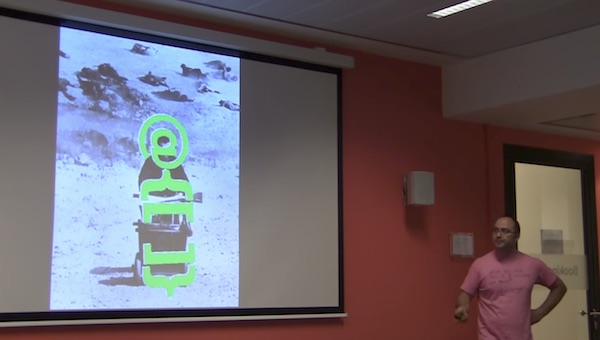Santa Baby(cart)
Pinecone Candypears was one of the Elves that the Wise Old Elf had wisely brought on to help with the JavaScript toolchain that was becoming an integral part of the new modern North Pole Intranet software. Pinecone wasn't producing the kind of JavaScript the Wise old elf had started out with back in the day with ye olde onclick handlers; Oh no, this modern JavaScript was a serious programming.
"You see", Pinecone was elaborating, "these days in our stack we program in ES6 - modern JavaScript - that's cross compiled with these yarn plugins to turn it into more compatible JavaScript that your dumb browser can run. This allows us to do some pretty funky stuff."
Just to demonstrate Pinecone typed some code into his editor and hit save:
const countMessage = `There are {presents} left in the sack`In the background yarn noticed the file was changed and produced a file that worked in the browser.
"Don't you see", Pinecone continued gleefully, "with the new backtick string notation we can stick variables directly into our strings."
"You've been able to do that since forever in Perl just with doublequotes", the wise old Elf smiled.
my $count_message = "There are $presents left in the sack";"Ah", Pinecone countered, "but what about a method call?"
const countMessage = `There are { sack.presents() } left in the sack`"Well, that's a little different", the Wise Old Elf admitted, "But there is a way"
Introducing the Babycart Operator
In Perl it's possible to put executable code directly in the middle of strings with something we like to call the "babycart operator".
my $count_message = "There are @{[ $sack->presents ]} left in the sack";The babycart operator was named by Philippe Bruhat (BooK) after a series of Japanese films featuring Samurai and babycarts - the code you're sticking in your string is inside the babycart!

It's not really an operator at all, but some clever abuse of several existing operators to get what we want. Consider first of all what happens to arrays that are placed in the middle of strings:
my @count = ( 6 );
my $count_message = "There are @count left in the sack";All the elements of the array are stringified and interpolated into the string. Since there's only one thing in the array, the string above gets turned into There are 6 left in the sack.
So what if we use an array reference instead, and use the @{ ... } operator to dereference it?
my $count = [ 6 ];
my $count_message = "There are @{ $count } left in the sack";Hey, that still works! Let's put the logic inside the anonymous array:
my $count = [ $sack->presents ];
my $count_message = "There are @{ $count } left in the sack";And now finally let's move that logic inside string:
my $count_message = "There are @{[ $sack->presents ]} left in the sack";But Where Is This Useful?
Even the Wise Old Elf wouldn't recommend using it in the above situation. It's probably better to just write:
my $count_message = 'There are '.$sack->presents.' left in the sack';But consider the heredoc where you can't just do that:
sub find_records_over {
my $self = shift;
my $min = shift;
return $self->database_handle
->selectall_arrayref(<<~"SQL",{},$min);
SELECT id, @{[ $self->fieldname ]}
FROM @{[ $self->tablename ]}
WHERE @{[ $self->fieldname ]} = ?
SQL
}